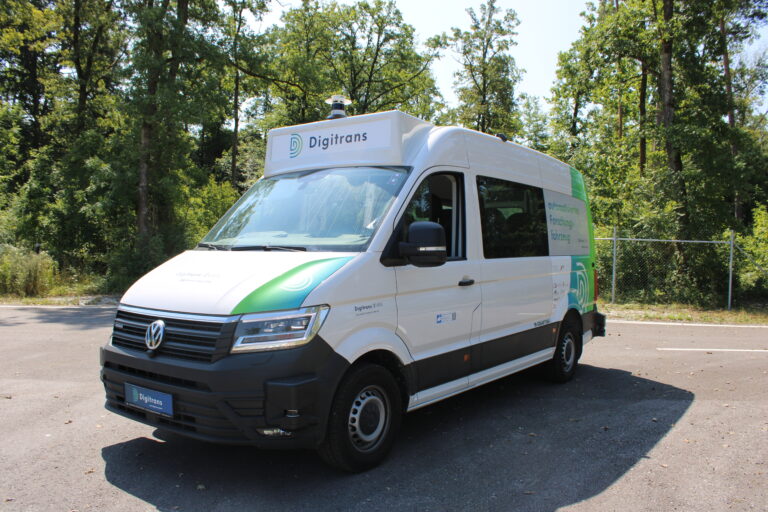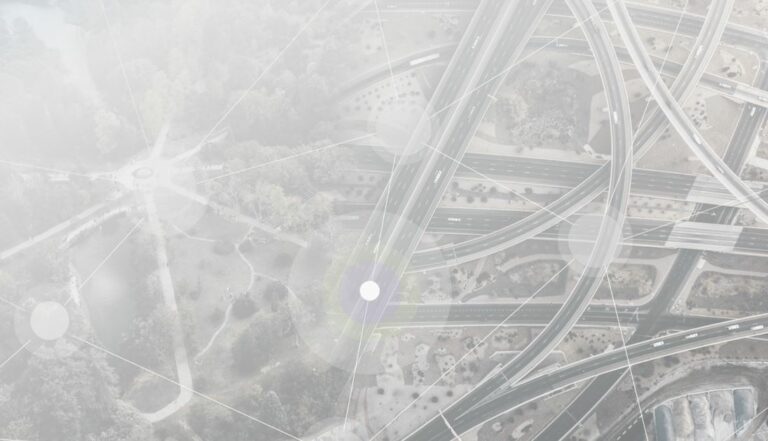New, automated test vehicle from Digitrans soon on the road in Austria as "Digibus® 2.0" in the municipality of Koppl in Salzburg.
The Digitrans eVAN automated test vehicle will start its first pilot project in 2023. It will be on the road for the first time in Austria in the coming months as “Digibus® 2.0” in the municipality of Koppl in Salzburg. At the end of 2022, initial measurement tests were carried out by Salzburg Research and Digitrans GmbH in preparation for automated pilot operation. Starting in spring 2023, the 100% battery-electric shuttle will supplement public transportation in the municipality of Koppl in Salzburg, Austria.
The Digitrans eVAN will be used in its first pilot project as “Digibus 2.0®” from the end of March to October 2023 on a defined route in public transport in the municipality of Koppl in Salzburg.
Salzburg Research GmbH is responsible for the pilot test with the automated shuttle in Austria as part of the Europe-wide research project SHOW “SHared automation Operating models for Worldwide adoption”.
Building on the experience gained from the Digibus® Austria project, automated transport is being tested for connecting rural regions to intermodal mobility hubs.
First measurement test drive of the automated test vehicle as part of "Digibus® 2.0" in Salzburg, Austria
The route for the test drives of the automated test vehicle in Koppl is over 1.7 kilometers long and has a total of 8 stops. It is equipped throughout with high-speed broadband Internet and five ITS-G5 roadside units to enable communication with the vehicle.
In order to be able to manage this route more quickly in an automated mode in spring 2023, the route in Koppl was already measured and recorded in December 2022 together with Salzburg Research GmbH using the Digitrans GmbH test vehicle.
Unlike partially automated vehicles, the fully automated test vehicle (Level 4) of DigiTrans GmbH can handle complex situations, such as turning at regulated or unregulated intersections. Driving into bus stops, as well as re-entering flowing traffic, will also be automated.
Such scenarios require, in addition to sensor technology, hardware and software in the vehicle, detailed knowledge of the route and surroundings in the form of digital maps. Therefore, measuring the driving route and analyzing the recorded sensor data is an extremely important aspect in order to be able to execute these scenarios safely and precisely in an automated manner.
The automated test vehicle Digitrans eVAN as the new “Digibus 2.0” during first test drives in the Salzburg community of Koppl as part of the European research project SHOW © Salzburg Research
„With the new automated test vehicle, higher speeds are now possible in accordance with the Austrian regulation for automated driving: with the previous vehicles, we were driving at a maximum of 20 km/h, now speeds of up to 50 km/h are possible“
Mag.(FH) Dipl.-Ing. Markus Karnutsch / Project Manager Salzburg Research GmbH

Preparations of the automated test vehicle for pilot operation in 2023 in Koppl, Austria
A 100% battery-electric VW e-Crafter is used as the base vehicle. At the moment, the vehicle is not yet fully automated. To enable it to take over all driving tasks independently in the future, it is currently being equipped with lots of sensors and additional software together with the partners in the Digitrans eVAN project.
In total, the automated test vehicle is equipped with eight radar sensors, six LiDAR sensors, four cameras with all-round vision and other sensors. They help the vehicle position itself and perceive its surroundings.
In addition, a destination display will be installed above the test vehicle’s windshield, and the passenger compartment will be adopted for automated passenger transportation. In place of the passenger seat, there is now a provisional measurement setup so that the first tests for safe automated driving can be carried out in advance. Barrier-free access for people with disabilities has also been taken into consideration.
As in previous test drives, a safety driver will also be required to be on board this time. The task of these “safety drivers” is to monitor the functions of the automated test vehicle and, if necessary, to take over the controls.
Preparations and modifications to the Digitrans eVAN automated test vehicle at project partner IAV © IAV GmbH
Details about the automated test and research vehicle Digitrans eVAN
The Digitrans eVAN research and test vehicle is provided by DigiTrans GmbH for Austrian research work. It was approved under the FFG’s 18th Mobility of the Future call for proposals and is funded by the Federal Ministry for Climate Protection via the Austrian Research Promotion Agency.
The major advantages of the Digitrans eVAN automated test vehicle over the previous models used is its modular design, open interfaces and openly available data. The vehicle can thus be optimally adapted to the respective test situation. The open interfaces and access to all the data material mean that important findings can be obtained for research.
With the automated research vehicle Digitrans eVAN, it will now be easier in Austria to test concepts for automated goods as well as passenger transport in practical use cases. This will promote and further advance the further development and research of mobility system innovations in Austria.
You might also be interested in
Further Insights

Digitrans eVAN – automated test vehicle level 4
The vehicle is equipped with the latest technology and is already able to drive most of its journey independently. It can be used both as a passenger and goods transporter.

Project RIAMO – rural communities enabled for integrated automated mobility
It involves the implementation of an efficient, automated on-demand shuttle service as part of a grant project. Accordingly, it is intended to provide residents of rural areas with better access to the higher-ranking public transport network.
